One-man shows 'BigMoutH' and 'SmallWaR' are bringing a unique view of history to the Brisbane Powerhouse starting in February. Written and performed by Valentijn Dhaenens of Belgium, BigMoutH is a retrospective of spoken history.
Dhaenens recites some of the speeches that changed the world, showcasing larger-than-life figures who not only inspired the masses to do good, but to do evil.
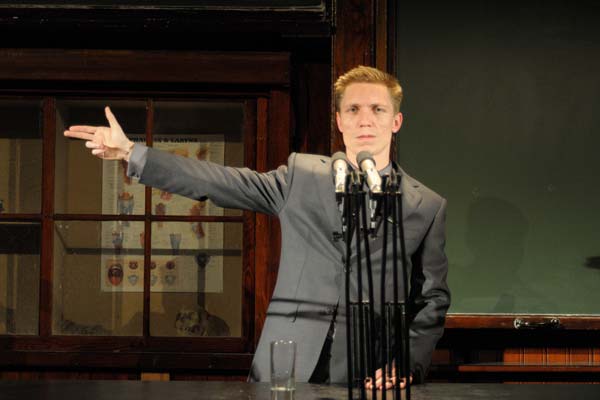 © Maya Wilsens
© Maya WilsensWhat makes a great orator? For every Obama throughout history with a soothing, confident voice to inspire and comfort the public, there is also a Hitler. Someone with just as influential a voice trying to convince people of something entirely different. Dhaenens doesn't limit himself to figures like Martin Luther King Jr. and Abraham Lincoln – he weaves in the words of less respected (but no less capable) speakers like Osama Bin Laden and Joseph Goebbels, showing the similar rhetoric displayed in language over time.
Where 'BigMoutH' looks at the grander figures of history and war, 'SmallWaR' is about the everyman – the the people who were really there on the ground while the speechmakers stood at their podiums. 'SmallWaR' was written as a companion piece to 'BigMoutH', both produced by the production company Dhaenens co-founded, SkaGeN. Based in part on real letters and stories taken from people who served and lived during wars (with an emphasis on the tragic young figures of World War I) Dhaenens primarily plays a field nurse in 1914, as well as several other characters.
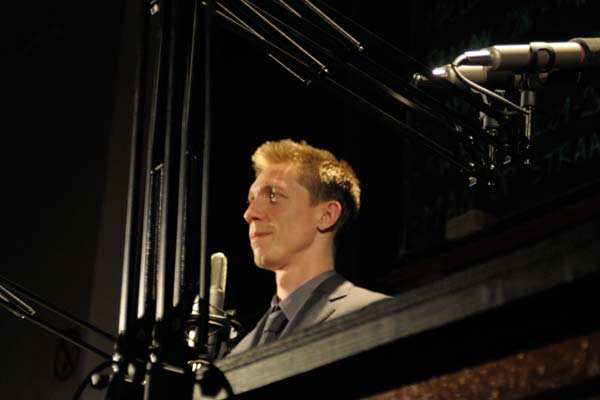 © Maya Wilsens
© Maya WilsensDespite being a show with only one performer on the stage, 'SmallWaR' makes use of that empty space with clever sound and set design, layering recordings, images, and videos over Dhaenens' stark performance. This use of multimedia has a ghostly effect, making 'SmallWaR' a haunting look at the psychology of war and the trauma felt by soldiers, nurses and their families. 'BigMoutH' and 'SmallWaR' let the audience hear from both the powerful people and the common people throughout history, all as told by one talented performer.
Some of the speechmakers Dhaenens quotes in 'BigMoutH' were the people who made wars happen, so it's appropriate that his companion show 'SmallWaR' gives his audience a chance to hear from the people on the receiving end of all the great speeches. For those interested in two contrasting and clever historical journeys, both shows are not to be missed.
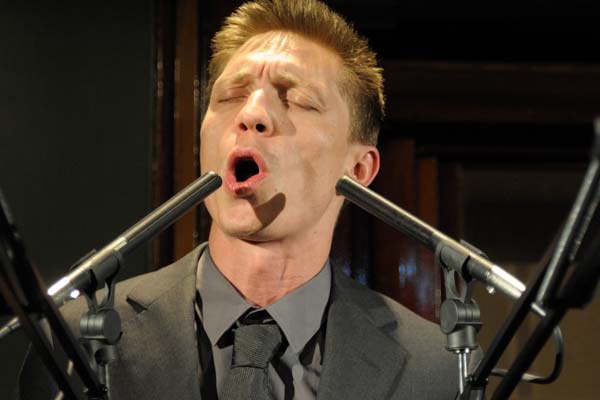 © Maya Wilsens
© Maya WilsensHow do you sort through thousands of years of public speaking, to pick the most important or interesting?
Over the course of a year, I promised myself to read at least 1 speech a day. I read over 1000 speeches that year. I developed a process to not think too much about it, just reading them and put them on stacks hoping one day certain speeches would start communicating with one another and it happened. For instance, there were many months between the reading of Goebbels and Patton. While reading Patton I was struck by the aggression in it and on a language level by how modern it was written. Very short sentences, very directly to the audience, almost no difference to modern speech writing. I started researching Patton a little bit and at one point found a part, when older, he reflected on this speech saying that there isn’t that much you can do with fear. In front of all these 19 year old soldiers who he knew would have to do D-day, he said that there was only one way to lift them over their fear of death. By making them larger than themselves so that they would go out screaming and shooting like medieval warriors did on horses when running towards each other in close combat on the battlefield.
Around this point I remembered the Goebbels speech somewhere on the in the “war-pile”. It was one of the first speeches I got into the project and I had it with me since long before starting developing BigMouth. You can still hear the sound recording of the speech in which we hear him screaming all the time with the immense crowd responding and shouting back. However, I was mostly fascinated by how beautifully written this speech was. With very long and complex sentences. Since this is the speech wherein he addresses the women to also get involved in the war industry (it was at the end of the war and most adult men were already fighting), I felt that this speech being softly and calmly spoken would also work as very hypnotizing.
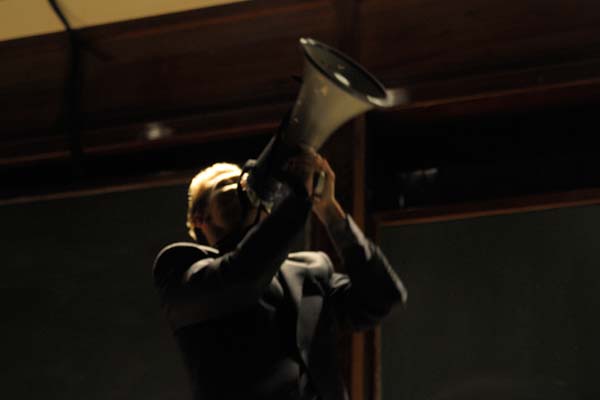 © Maya Wilsens
© Maya WilsensI checked the dates of both speeches and there wasn’t much time between them. Mixing up these two speeches I could incorporate so many levels that they were almost begging to be interwoven. I had two big leaders being enemies in the same war, both at the end of a war. One addressing the women; the other, the very young some of who had never shot a gun in their lives. A very extreme difference in style, tone, tempo and choice of words. The clash of the two big Germanic languages demanding a different approach. Patton already aiming for quotes and short bits people could remember (it was only in the 60’s that this kind of speaking took his definitive form). Goebbels, still referring to the Greek with his classic build up, beautiful rhetoric, his repetitiveness to ensure it would keep stuck in their minds. They both have the same goal but do it in a very different way.
BigMouth is kind of abstract of course but still I also felt the sensation of bringing these two leaders together in the same room, like modern debates giving each of them a chance to persuade the same audience. This last thing (same audience) as well as being performed by the same actor being very important to me since I wanted the stress to be on one mankind, one culture of war, one civilization.
At the same time hoping to eliminate the good guy / bad guy trap by making them interchangeable.
This is an example of how these two speeches came together. And it is in a certain way representative for how the whole show came together. Just hoping the speeches would start looking for each other and just me dealing with them always in a different way aiming to give as much as possible variety in use of language, words and human voice.
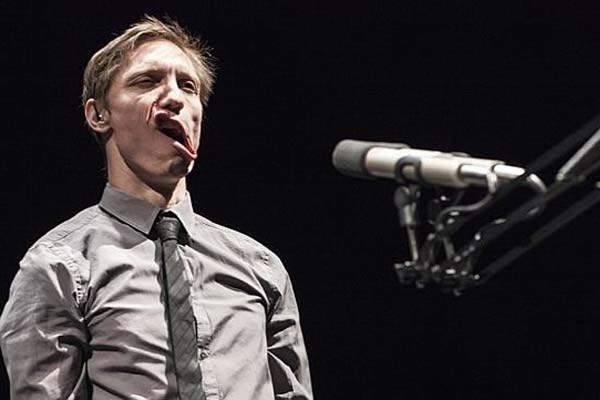 © Maya Wilsens
© Maya WilsensOn the different time periods...
While being very aware of them, being curious about historical context of each speech and getting to recognize the development of speaking through the ages, I found a lot of fun of forgetting about the dates as well and dealing with them as if they were all written by the same person at the same time. As some people suggested, to put the speeches in chronological order or work in certain time frames (such as the I wanna live in America until the Farrakhan part), I couldn’t think of anything more boring and academic. I wanted BigMouth to be the opposite, treating every speech equal to another trusting the audience to, for most parts, have the connection already in the back of their minds and them trusting me to play/fool around with the speeches to tell a different story about us as mankind, about nothing that really changed, about us wanting to be God. Much more than giving a brief history of the world through speeches.
Do you have a favourite historical speech?
On the crown by Demosthenes (330 BC) is the most genius and complex speech I have ever read, although it’s not in BigMouth. I actually locked myself up for 4 days to try and turn this 100 page speech into 5 pages for inclusion in the show only to learn that I had totally destroyed the brilliant build up and was only presenting highlights that didn’t resonate with people who weren’t familiar with the speech.
 © Inge Lauwers
© Inge LauwersWhat makes a speech great? Does it have to inspire actual change, or just be well-written?
A speech can only be great if it’s a perfect match with the speaker of that speech. And there’s always a need for an event at a certain time in a certain place that makes people sensitive to certain issues. It’s always a combination of these three. In general, the important things of a good speech that I can come up with are: OVERCOME DISTRUST; BE SEDUCTIVE; BE FEARLESS; BE SPOKEN BY A MASTER OF WORDS; CHARISMA AND TIMING. IF THINGS ARE GOING TO GET TOUGH, PROMISE REWARDS AFTERWARDS, IF NOT FOR YOURSELF, FOR FUTURE GENERATIONS.
Hitler is lauded as having been a great orator – how much influence do you think someone can have when they can make anything sound like a good idea?
You’re already answering the question by giving Hitler as an example. I guess to be a real “bigmouth”, you need - aside from the oratory talents - the subconscious drive to be a sort of a God, the urge to move people in a certain direction and a bottomless need for attention and love. Most of us aren’t bigmouths.
How does doing a one-man show compare to other acting you've done?
What I like most about making and performing a one-man show is the fact that I can work very intuitively. In collaboration with other people you always have to discuss everything and explain every decision you want to make. Performing alone is also addictive as you can totally change the pace, try something different if you feel like it and you have this very particular and intimate interaction and bond with the audience.
With 'SmallWaR', why did you decide to focus on WWI? Were you influenced by the poetry that came out of that time?
Not so much though I really was amazed by reading lots of war poetry. We have a famous Belgian writer called Tom Lanoye who has so brilliantly translated WW1 poems they often seemed better than the original. The final lines of SmallWaR are, however, dulce et decorum est pro patria mori out of Wilfred Owen’s famous poem. They summarize perfectly SmallWaR. I focused on WW1 because of the centennial but mostly because for me it’s the perfect symbol for war as we know it today. As if there and then the industrial war as we know it today was invented. Tanks were invented, chemical warfare, bombing from the air, machine guns, plastic surgery. Whether you lived or died wasn’t about any martial skills but about pure luck. And this image of troops fighting over 5 years for 100 meter back and forth symbolizes the absurd repetition of war. As if we never learn and every few decades end up in the same mud trench.
Is it difficult to immerse yourself in the topic of war and trauma? How does it affect you?
I guess it’s my biggest fear. My daughter was born while preparing this show. I’m sure it had quite an impact on how the show came together. On the other hand it wasn’t always easy to experience the greatest joy of my live and at the same time have to envelope myself in the topic of war through history and reading about the greatest atrocities.
Did you always intend 'SmallWaR' to be a companion piece to 'BigMoutH'? How did that come about?
No, BigMouth was intended to be a stand-alone show. But while performing BigMouth in the UK, I was kind of surprised how audiences were willingly being seduced by all these historical speeches but at the same time often forgot what they led to. Soon grew this urge to make a show about the small victims of all these big speeches, the casualties of all these beautiful rhetoric.
How would you describe the tone of the shows, for audiences who haven't seen them before? Do you think 'SmallWaR' in particular is confronting for people?
BigMouth is like a very dynamic show, spectacular in a way and a bit a pop-concert with speeches instead of songs. There’s a lot of live music in it as well and a lot of climaxes are built in. SmallWaR is quite the contrary. It’s the flipside of BigMouth and it focuses on the trauma like a nightmare you can’t get out of. The pace is repetitive. In SmallWaR, video is used in the same way audio is used in BigMouth. It’s very impressive and at the same time very fragile.
What made you decide to use the multimedia effects in 'SmallWaR', where in 'BigMoutH' it was just yourself on stage?
In SmallWaR it’s also just myself on stage but through video I can impersonate several characters at the same time. The central image is a guy (me) in a bed without legs, arms, sight, senses. It was inspired by the main character in Dalton Trumbo’s novel Johnny got his gun. The other characters I play are all different versions of me that could be all created in his mind. Like in a dream when one sees himself from a distance.
'BigMoutH' and 'SmallWaR' play Brisbane Powerhouse 25-27 and 26-27 February, respectively, as part of WTF which runs 18-27 February.
– written by Stephanie O'Neill


